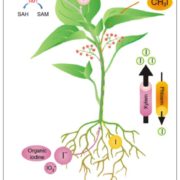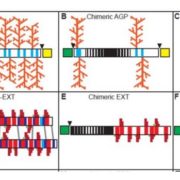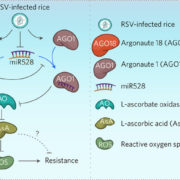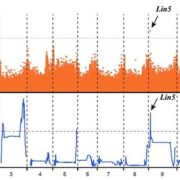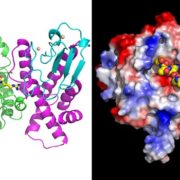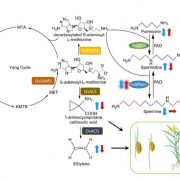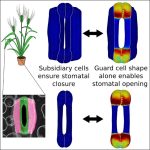Soluble and insoluble α-glucan synthesis in yeast by enzyme suites derived from maize endosperm
 Starch is a polymer of α-glucose which is assembled into insoluble, semi-crystalline granules in plants. It is not known why we see only insoluble starch granules in plants and no soluble α-glucan polymers. To investigate this, Boehlein et al. took a synthetic biology approach. Eleven starch metabolism genes from maize endosperm were expressed in differing combinations in a yeast strain with impaired glycogen metabolism (so as not to interfere with starch synthesis). Expression of the starch debranching enzyme ISA1 promoted the formation of insoluble α-glucan polymers and a reduction in the amount of soluble α-glucan polymers. The most striking change occurred in a strain expressing five starch synthase genes and the starch phosphorylase PHO1. Expressing ISA1 in this strain increased the amount of insoluble α-glucan polymers from 16% to 82%. The structure of these insoluble α-glucan polymers was investigated with scanning and transmission electron microscopy. In strains without ISA the particles had an oblate shape whilst strains containing ISA had particles which were more spherical. Therefore, this synthetic biology system has elucidated the role of ISA1 in promoting insoluble starch granule formation and influencing granule morphology. This system could be exploited further by expressing other factors involved in starch granule formation. (Summary by Rose McNelly @Rose_McN) Plant Physiol. 10.1093/plphys/kiad358
Starch is a polymer of α-glucose which is assembled into insoluble, semi-crystalline granules in plants. It is not known why we see only insoluble starch granules in plants and no soluble α-glucan polymers. To investigate this, Boehlein et al. took a synthetic biology approach. Eleven starch metabolism genes from maize endosperm were expressed in differing combinations in a yeast strain with impaired glycogen metabolism (so as not to interfere with starch synthesis). Expression of the starch debranching enzyme ISA1 promoted the formation of insoluble α-glucan polymers and a reduction in the amount of soluble α-glucan polymers. The most striking change occurred in a strain expressing five starch synthase genes and the starch phosphorylase PHO1. Expressing ISA1 in this strain increased the amount of insoluble α-glucan polymers from 16% to 82%. The structure of these insoluble α-glucan polymers was investigated with scanning and transmission electron microscopy. In strains without ISA the particles had an oblate shape whilst strains containing ISA had particles which were more spherical. Therefore, this synthetic biology system has elucidated the role of ISA1 in promoting insoluble starch granule formation and influencing granule morphology. This system could be exploited further by expressing other factors involved in starch granule formation. (Summary by Rose McNelly @Rose_McN) Plant Physiol. 10.1093/plphys/kiad358


